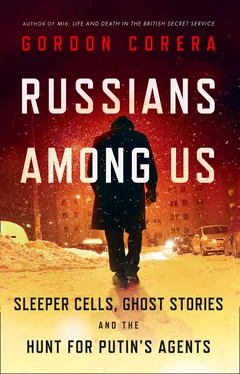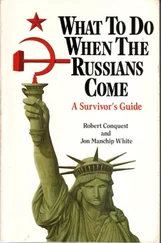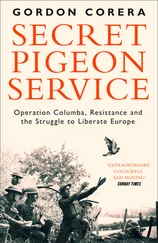It was precisely what had annoyed him—having to go back home—that offered a rich opportunity for the FBI. Tretyakov had defected and stayed in the United States, but the real prize was being able to run an agent-in-place in Moscow who could continue to work his way up the system and deliver secrets. That is what the FBI wanted and the risk Poteyev was willing to take.
To succeed, an intelligence organization makes sure the recruitment and running of an agent is on a need-to-know basis within its own corridors. There is a reason for that. And the Poteyev case was a prime example. Just as the FBI had, in the form of Poteyev, recruited a source inside the SVR, the SVR was at that time still running its own agent inside the FBI who had not been identified. Robert Hanssen was the man who had been dropping off secrets in the park on August 19, 1991, as the Moscow coup took place. A misfit who shared details of his sexual fantasies about his wife online, he began to spy way back in 1979. He had actually stopped in the wake of the coup and the end of the Soviet Union, but in 1999, he resumed contact with the SVR and began to provide more vital intelligence. If word had got around the bureau about the new recruitment, Poteyev may not have lasted long. The counterintelligence spy games of the Cold War had still not yet finished playing out.
As he landed back in Moscow, Poteyev would have known his new secret could destroy his life if it was discovered. He was heading for a double life and walking his own tightrope, one that he knew could end at any moment if he made a slip or—more likely—if someone else betrayed his secret to the SVR. But on his return, he received a dream posting—for him and his new American friends. He was to join the senior ranks of Directorate S. He would eventually become the deputy head of Department 4—the team responsible for running illegals in the United States, Canada, and Latin America. This was one of the most secretive, compartmentalized parts of the entire SVR. Only a tiny group of people was allowed to know the identities of illegals sent abroad, in order to protect them. Only three officers had access to the personal files of illegals operating in the United States. Poteyev was going to be one of them and he was in charge of their day-to-day operational management. This was a stunning success for his handlers—if they could keep him from getting caught.
RUSSIA’S SPIES WERE on the back foot. And at the same time that the United States was scoring a success with one veteran of the Afghan war, MI6 had managed something similar with another. And the fate of the two spies would ultimately be drawn together.
IN MADRID IN the summer of 1996, a rugged first secretary at the Russian Embassy was walking in a park with a businessman from Gibraltar. The first secretary was an officer of the GRU—military intelligence. His name was Sergei Skripal. The businessman was an MI6 officer operating under “natural cover.” The Russian had been spotted by the Spanish as someone who might be interested in money. He was first introduced to a Spaniard. They talked about going into business together, exporting wine to Russia. The Spaniard next introduced Skripal to the businessman, who would offer something more lucrative but also more dangerous. The lure was the promise that together they might be able to go into the oil business in Russia. But as Skripal prepared to return to Moscow at the end of his posting, the MI6 officer showed his hand and revealed what he was really after.
This was typical of the kind of pitches to Russians in this period. It would involve approaching someone and offering them a contract for consultancy or discussions about business. No secrets would pass. But after a while, it would be explained that this work was sadly at an end but there was another possibility—perhaps further business dealings of a more sensitive nature. This would require the individual being put in touch with someone more closely associated with the British government. If you pitch right away saying, “Do you want to pass secrets for money?” the answer will be no. But one step at a time, reeling someone in can be a lot easier.
By the middle of the decade, MI6 had reduced by two-thirds the amount of effort it put into spying against Russia and the former Soviet Union. But a sharp young officer, Charles Farr, had taken over Russian operations in London and made the case that MI6 needed to take advantage of the moment and recruit sources for the long term. The officer who met with Skripal was a prodigious pitcher of Russians; “a magic recruiter” is how one of his colleagues remembers him. Skripal proved receptive. The reason was simple—he liked money and did not have much.
Skripal grew up in Kaliningrad, a strategic enclave on the Baltic coast sandwiched between Poland and Lithuania. It was a closed military zone but near enough to the West for the young Sergei to pick up the tinny sounds of BBC World Service radio, which carried news of a more colorful world. His father had been an artillery officer and Skripal joined the elite Soviet airborne troop. He, like Poteyev, had been sent to Afghanistan at the opening of the conflict to carry out undercover missions. These included targeting locals suspected of working with the CIA. Where Poteyev worked for the KGB, Skripal was selected to join Russian military intelligence—the GRU. The eyes and ears of the General Staff, it had always been a tough and uncompromising service, motivated more by patriotism and a military ethos than the ideological focus of the KGB, with which it competed.
The GRU took treachery seriously. There were claims that recruits were shown a film of one traitor being pushed into a furnace and burned alive. It was the one part of the Soviet Intelligence apparatus that did not change in name or culture as the Soviet Union became Russia. It included special forces and its own illegals whose job was to prepare for sabotage in the event of war. Caches of weapons were left ready (the West did something similar in Western European nations in case they were overrun). The GRU also had officers stationed under diplomatic cover in embassies, collecting information on military intentions and technology, including by recruiting agents. Skripal’s role, after graduating from the Diplomatic Military Academy, was in its First Directorate, which focused on Europe. After the collapse of the Soviet Union, he had ended up in Madrid. And by the end of his time there he had acquired an MI6 code name: Forthwith.
How important was he as an agent? Opinions differ. In the late 1990s, the customers of MI6—the Foreign Office and Ministry of Defence—were primarily interested in political developments in Russia and details of proliferation of weapons of mass destruction. But what Skripal could offer was largely counterintelligence—details of the GRU and its operatives. This was of niche value, although for those interested in it, Skripal was an excellent source. His cooperation was erratic rather than regular. He was not classed as a full-fledged, recruited agent when he left Madrid and no one was sure his cooperation would continue when he returned to Moscow. But it would. And his new, senior role in the personnel department meant he was able to identify hundreds of GRU officers operating under diplomatic cover overseas, whose details MI6 could then pass on to other countries.
By the start of 2000, Skripal and Poteyev were both in Moscow, providing intelligence from inside their own spy agencies. The actual recruiting of a Russian spy on their home territory of Moscow itself is almost impossible. The slow cultivation of a relationship and the careful conversations required to sound someone out would almost certainly be spotted by the vast counterintelligence machinery. But if you have managed it overseas—like with Poteyev in New York or Skripal in Madrid—then it may be possible to run them back in Russia. But only one of this pair would escape capture. With Poteyev in Directorate S, US intelligence had scored a stunning coup. They had opened up a window right into the heart of the most secretive part of their adversary’s operations against them. As long as they had their source in place, they would be able to track illegals operating in the United States.
Читать дальше












